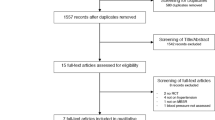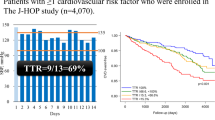Abstract
The objective of this randomized controlled trial is to evaluate the benefits of mindfulness meditation in controlling ambulatory blood pressure (BP) and the impact of the intervention on anxiety, stress and depression levels in a Mediterranean population. Twenty-four and 18 patients [n = 42; mean age 56.5 (7.7) years; similar men and women proportions] with high-normal BP or grade I hypertension were enrolled to an intervention and a control group, respectively. For 2 h/week over 8 weeks, the intervention group received mindfulness training and the control group attended health education talks. The patients attended pre-intervention, week 4, week 8 and week 20 follow-up visits. 61.9% of the patients had anxiety, 21.4% depression, 19.0% were smokers and 14.2% were diabetic (no significant differences between the 2 groups). At baseline, the intervention group had non-significant higher clinically measured BP values, whereas both groups had similar ambulatory BP monitoring (ABPM) values. At week 8, the intervention group had statistically significant lower ABPM scores than the control group (124/77 mmHg vs 126/80 mmHg (p < 0.05) and 108/65 mmHg vs 114/69 mmHg (p < 0.05) for 24-h and night-time systolic BP (SBP), respectively) and also had lower clinically measured SBP values (130 mmHg vs 133 mmHg; p = 0.02). At week 20 (follow-up), means were lower in the intervention group (although not statistically significant). Improvements were observed in the intervention group in terms of being less judgemental, more accepting and less depressed. In conclusion, by week 8 the mindfulness group had lower clinically measured SBP, 24-h SBP, at-rest SBP and diastolic BP values.
This is a preview of subscription content, access via your institution
Access options
Subscribe to this journal
Receive 12 digital issues and online access to articles
$119.00 per year
only $9.92 per issue
Buy this article
- Purchase on Springer Link
- Instant access to full article PDF
Prices may be subject to local taxes which are calculated during checkout


Similar content being viewed by others
References
Zanchetti A, Christiaens T, Dominiczak A, Kjeldsen SE, Nilsson PM, Sirnes PA et al. Hipertensión. Hipertens Riesgo Vasc. 2013; 30:9–12.
Koike MK, Cardoso R. Meditation can produce beneficial effects to prevent cardiovascular disease. Horm Mol Biol Clin Investig. 2014;18:137–43.
Carreira Capeáns C, Facal D. Ansiedad en las personas mayores de 50 años. Datos de un estudio representativo de la población mayor en España. Rev Esp Geriatr Gerontol. 2017;52:8–11.
Goldstein CM, Josephson R, Xie S, Hughes JW. Current perspectives on the use of meditation to reduce blood pressure. Int J Hypertens. 2012; 2012. https://doi.org/10.1155/2012/578397.
Hughes JW, Fresco DM, Myerscough R, van Dulmen MH, Carlson LE, Josephson R, et al. Randomized controlled trial of mindfulness-based stress reduction for prehypertension. Psychosom Med. 2013;75:721–8.
Perry RJ, Samuel VT, Petersen KF, Shulman GI, Haven N, Haven N. HHS Public Access. 2015;510:84–91.
Rainforth MV, Schneider RH, Nidich SI, Gaylord-King C, Salerno JW, Anderson JW. Stress reduction programs in patients with elevated blood pressure: a systematic review and meta-analysis. Curr Hypertens Rep. 2007;9:520–8.
Brook RD, Appel LJ, Rubenfire M, Ogedegbe G, Bisognano JD, Elliott WJ, et al. Beyond medications and diet: alternative approaches to lowering blood pressure: A scientific statement from the american heart association. Hypertension. 2013;61:1360–83.
Brook RD, Jackson EA, Giorgini P, McGowan CL. When and how to recommend ‘alternative approaches’ in the management of high blood pressure. Am J Med. 2015;128:567–70.
Park S-H, Han KS. Blood pressure response to meditation and yoga: a systematic review and meta-analysis. J Altern Complement Med. 2017; 00: acm.2016.0234.
Shi L, Zhang D, Wang L, Zhuang J, Cook R, Chen L. Meditation and blood pressure: a meta-analysis of randomized clinical trials. J Hypertens. 2017;35:696–706.
Blom K, How M, Dai M, Baker B, Irvine J, Abbey S, et al. Hypertension Analysis of stress Reduction using Mindfulness meditatiON and Yoga (The HARMONY Study): study protocol of a randomised control trial. BMJ Open. 2012;2:e000848.
Schneider RH, Alexander CN, Staggers F, Rainforth M, Salerno JW, Hartz A, et al. Long-term effects of stress reduction on mortality in persons >or = 55 years of age with systemic hypertension. Am J Cardiol. 2005;95:1060–4.
Barnes VA, Treiber FA, Johnson MH. Impact of transcendental meditation on ambulatory blood pressure in African-American adolescents. Am J Hypertens. 2004;17:366–9.
Manikonda JP, Störk S, Tögel S, Lobmüller A, Grünberg I, Bedel S, et al. Contemplative meditation reduces ambulatory blood pressure and stress-induced hypertension: a randomized pilot trial. J Hum Hypertens. 2008;22:138–40.
Schneider RH, Alexander CN, Staggers F, Orme-Johnson DW, Rainforth M, Salerno JW, et al. A randomized controlled trial of stress reduction in African Americans treated for hypertension for over one year. Am J Hypertens. 2005;18:88–98.
Segal, ZV, Williams, JMG, Teasdale JD. Mindfulness-based cognitive therapy for depression: A New aprroach to relapse Prevention. Guildf. Press. 2002. https://scholar.google.com/scholar_lookup?title=Mindfulness-based cognitive therapy for depression%3A A new approach to relapse prevention&author=ZV. Segal&author=JMG. Williams&author=JD. Teasdale&publication_year=2002 (Accessed 8 Oct 2017).
Baer RA, Smith GT, Hopkins J, Krietemeyer J, Toney L. Using self-report assessment methods to explore facets of mindfulness. Assessment. 2006;13:27–45.
Cebolla A, García-Palacios A, Soler J, Guillen V, Baños R, Botella C. Psychometric properties of the Spanish validation of the Five Facets of Mindfulness Questionnaire (FFMQ). Eur J Psychiatry. 2012;26:118–26.
Henry JD, Crawford JR. The short-form version of the Depression Anxiety Stress Scales (DASS-21): construct validity and normative data in a large non-clinical sample. Br J Clin Psychol. 2005;44:227–39.
Nyenhuis DL, Yamamoto C, Luchetta T, Terrien A, Parmentier A. Adult and geriatric normative data and validation of the profile of mood states. J Clin Psychol. 1999;55:79–86.
Cohen S, Williamson GM. Perceived stress in a Probability Sample of the United States. In: The Social Psychology of Health. Newbury Park, CA: Sage. 1988; pp 31–67.
Remor E. Psychometric Properties of a European Spanish Version of the Perceived Stress Scale (PSS). Span J Psychol. 2014;9:86–93.
Lovibond, SH, Lovibond PF. Manual for the Depression Anxiety Stress Scales. 2nd edn. Sydney, Australia, 1995 http://www2.psy.unsw.edu.au/dass/ (Accessed 3 Oct 2018).
Lovibond PF, Lovibond SH. The structure of negative emotional states: Comparison of the Depression Anxiety Stress Scales (DASS) with the Beck Depression and Anxiety Inventories. Behav Res Ther. 1995;33:335–43.
Cornelissen VA, Fagard RH. Effects of endurance training on blood pressure, blood pressure-regulating mechanisms, and cardiovascular risk factors. Hypertension. 2005;46:667–75.
Bai Z, Chang J, Chen C, Li P, Yang K, Chi I. Investigating the effect of transcendental meditation on blood pressure: a systematic review and meta-analysis. J Hum Hypertens. 2015;29:653–62.
Delgado LC, Guerra P, Perakakis P, Vera MN, del Paso GR, Vila J. Treating chronic worry: Psychological and physiological effects of a training programme based on mindfulness. Behav Res Ther. 2010;48:873–82.
Acknowledgements
We would like to thank Ailish Maher for revising the English in a version of this manuscript.
Author information
Authors and Affiliations
Corresponding author
Ethics declarations
Conflict of interest
The authors declare that they have no conflict of interest.
Electronic supplementary material
Rights and permissions
About this article
Cite this article
Ponte Márquez, P.H., Feliu-Soler, A., Solé-Villa, M.J. et al. Benefits of mindfulness meditation in reducing blood pressure and stress in patients with arterial hypertension. J Hum Hypertens 33, 237–247 (2019). https://doi.org/10.1038/s41371-018-0130-6
Received:
Revised:
Accepted:
Published:
Issue Date:
DOI: https://doi.org/10.1038/s41371-018-0130-6
This article is cited by
-
Effect of mindfulness-based interventions on people with prehypertension or hypertension: a systematic review and meta-analysis of randomized controlled trials
BMC Cardiovascular Disorders (2024)
-
Spiritually Based Interventions for High Blood Pressure: A Systematic Review and Meta-analysis
Journal of Religion and Health (2024)
-
Effects and Feasibility of a Mindfulness-Based Guqin Music Intervention During Pregnancy on Postpartum Anxiety and Depression: A Pilot Randomized Controlled Trial
Mindfulness (2023)
-
A systematic review and meta-analysis of mindfulness-based stress reduction for arterial hypertension
Journal of Human Hypertension (2022)
-
Lifestyle interventions for the prevention and treatment of hypertension
Nature Reviews Cardiology (2021)



